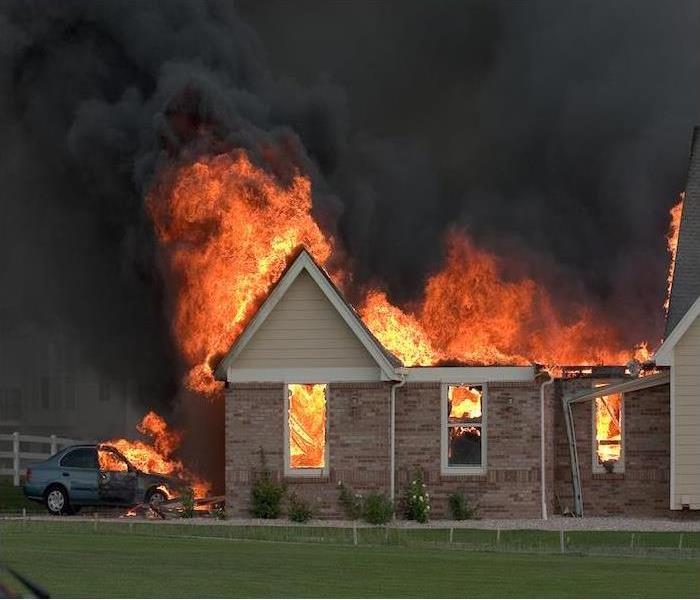Insuring Your Home Against Fire Damage
7/11/2022 (Permalink)
A fire is probably the most devastating event that can occur in your home. A small fire can quickly become an inferno and spread until all of your belongings are destroyed.
The NFPA says that there are numerous causes of fires in the home ranging from kitchen appliances being left onto lightning strikes. Even if you do all you can to prevent a fire from occurring in your home, sometimes they are unpreventable. So it’s important that homeowners protect their property investments with the proper insurance.
Fire Insurance Coverage
Depending on what type of property insurance you have, you may already be covered for a fire. Providers offer different coverage options so it’s important that you review your details carefully and understand exactly what kind of protection you have.
According to the Insurance Information Institute, the average fire claim is in excess of $37,150. The two most common ways to insure your home against fires are standard home insurance and dwelling fire coverage.
Standard Home Insurance
If you are a homeowner, your mortgage likely required you to purchase a homeowners insurance policy. These standard home insurance policies typically cover fire damage. They might also protect your personal contents such as furniture, electronics, or other personal possessions.
Many policies will also include loss of use coverage. If your home becomes uninhabitable due to a claim that is covered by your policy, your loss of use coverage will kick in. Under this type of coverage, the insurance company may reimburse you for your extra living expenses while your home is in the process of being either repaired or rebuilt.
If you live in an apartment or if you rent your home, the landlord likely will have purchased coverage for the building. However, you’ll be responsible for protecting your own belongings. Standard renters policies are relatively cheap and can provide coverage for your personal property in the event of a fire.
Dwelling Fire Coverage
Dwelling fire coverage is generally less comprehensive than standard home insurance. Similar to standard home insurance it protects the building itself and other structures on the property. It also generally offers loss of use coverage if you have to relocate for a period of time. However, this type of insurance doesn’t cover your personal belongings or personal liability protection. Dwelling fire coverage is generally best used to protect a vacation home or a vacant home where you’ll have less of your personal belongings around.
How to File a Claim
Before filing your claim on a fire, you should take photos of the damage. Having the proper documentation available can make the process of filing the claim go much smoother.
After you have all the damage surveyed and documented, it’s time to contact the insurer and file the claim. The insurer will send a claims adjuster to your property to assess the damage and put together a cost estimate.
Once the claims adjuster has finished assessing the damage the repairs can begin on the property. Depending on the damage, repairs to your property could take anywhere from weeks to months to complete. Throughout the ordeal, it’s important to stay organized. Keep all emails, invoices, estimates, and any other documentation you may have received that relates to the damage.
Another way to make the process smoother is to have a full, up-to-date inventory detailing all of the items in your home. If you happen to lose everything in the fire, this inventory can help you to remember all of the items that you need replaced. In case your list happens to be destroyed in the fire as well, you should keep an electronic copy of the inventory that you can pull up if needed. If you prefer, there are some home inventory apps that you can download on your smartphone.
Prevent Fires Before They Start
No matter how prepared you are, a fire always has the potential to occur. But basic knowledge of fire safety can significantly reduce the chances that one will destroy your home. It’s important that you have basic fire safety knowledge and outfit your home with fire safety equipment.
Smoke alarms, sprinkler systems, and fire extinguishers can prevent a small fire from turning into flames that engulf your home. Having fire safety equipment can also help you to save money on your home insurance premium. Many home insurance providers will offer discounts if you have smoke alarms and sprinkler systems installed in your home.
It’s also important to make sure your entire family understand the basics of fire safety. Some basics to include are an evacuation plan, knowledge of potential fire causes, and a copy of the NFPA’s tips from the fire safety information section of their website.
Regardless of how prepared you are, a fire is always a possibility in your home. So it’s important to have insurance that will cover you should something happen. If you do suffer a fire, have the professionals at SERVPRO come and restore your home and possessions.






 24/7 Emergency Service
24/7 Emergency Service
